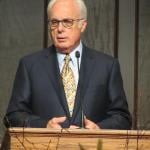For a number of years some Baptists and some Catholics discussed points of unity and diversity and came to a wonderful statement, called The Word of God in the Life of the Church: A Report of International Conversations between The Catholic Church and the Baptist World Alliance, 2006-2010.
I have clipped the introduction and the emboldened paragraphs of this statement from the Vatican site.
What do you think of efforts like these? Will they filter down to the local congregations? What does it take to get them to the congregations?
“The goal of these conversations is to respond to the prayer of our Lord Jesus Christ to his Father for his disciples ‘that they may all be one … that the world may believe’ (John 17:21). Facing the challenges of our world today, we believe this means that we should continue to explore our common ground in biblical teaching, apostolic faith and practical Christian living, as well as areas that still divide us, in order to:
1. Increase our mutual understanding, appreciation of each other and Christian charity towards each other;
2. Foster a shared life of discipleship within the communion of the triune God;
3. Develop and extend a common witness to Jesus Christ as the Saviour of the world and the Lord of all life;
4. Encourage further action together on ethical issues, including justice, peace and the sanctity of life, in accord with God’s purpose and to the praise of God’s glory.
We envisage that we can move towards the fulfilment of these aims by focusing on the theme: ‘The Word of God in the Life of the Church: Scripture, Tradition and Koinonia.’”
2. The theme which had been identified was handled in five annual meetings lasting a week in December each year, from 2006-2010:
(1) The Authority of Christ in Scripture and Tradition, hosted by Beeson Divinity School at Samford University in Birmingham, Alabama, USA.
(2) Baptism and Lord’s Supper/Eucharist as Visible Word of God in the Koinonia of the Church, hosted by the Pontifical Council for Promoting Christian Unity in Rome, Italy.
(3) Mary in the Communion of the Church, hosted by the Baptist House of Studies at the Divinity School, Duke University, Durham, North Carolina, USA.
(4) Oversight and Primacy in the Ministry of the Church, hosted by the Pontifical Council for Promoting Christian Unity in Rome, Italy.
(5) A Final Meeting for gathering the harvest of the previous sessions, and working on a draft report, hosted by two Halls of the University of Oxford: Regent’s Park College (Baptist) and St. Benet’s Hall (Benedictine).
7. The One God exists from eternity in a life of relationship, in a communion (koinonia) of three Persons, Father, Son and Holy Spirit. Jesus Christ, the eternal Son, is the Word of God as God’s self-communication of self-giving love. Jesus Christ is thus God’s self-revelation who draws us into the communion of God’s own triune life and into communion (koinonia) with each other. This means that the Word of God in the church in the fullest sense is Christ himself who rules as Lord in the grace and power of the Spirit.
11. The church is thus to be understood as a koinonia (‘communion’, ‘participation’ or ‘fellowship’), which is grounded in the koinonia of the triune God. Believers are joined inkoinonia through participation in the communion of Father, Son and Holy Spirit. At the same time they are in koinonia through their participation in the community of believers gathered by Christ in his church: ‘…that you may have fellowship with us. And truly our fellowship is with the Father and with his Son Jesus Christ’ (1 Jn. 1:3). While the phrase ‘communion ecclesiology’ is relatively recent, and is more frequently used by Catholic theologians than by Baptist ones, we both recognize it as expressing the heart of the nature of the church.
12. The principle of koinonia applies both to the church gathered in a local congregation and to congregations gathered together, whether in a regional association of churches (in the Baptist model) or in a local church (in the Catholic sense), or in still wider expressions of the church universal. We agree that the local fellowship does not derive from the universal church, nor is the universal a mere sum of various local forms, but that there is mutual existence and coinherence between the local and universal church of Christ.
16. The koinonia of the church may also be understood as a ‘covenant community’ although this language is less familiar to Catholics than to Baptists. ‘Covenant’ expresses at once both the initiative and prior activity of God in making relationship with his people through Christ, and the willing commitment of people to each other and to God. The church is a ‘gift’ in the sense that it is ‘gathered’ by Christ, and it ‘gathers’ in response to the call of Christ. The term ekklesia indicates an ‘assembly’ that is ‘called out’ by God. Calling the church a ‘fellowship of believers’ does not mean that the church is constituted only by faith: faith is always a response to the initiating grace of God. The fellowship or koinonia of the church itself is both a gift and calling, just as the unity of the church is both a gift of the Spirit and a task to be achieved.
20. Communion with the triune God and with the whole church of Christ is continually actualized in the Eucharist/Lord’s Supper. In the celebration, those participating are sharing communion not only with each other in the local congregation, but with the whole church of Christ in time and space. ‘Because there is one bread, all of us share in one body’ (1 Cor. 10:17). Because we hear the word of God in the eucharist/Lord’s Supper, this is a sharing in both word and sacrament (or ordinance) at the same time.
23. Local churches must be in visible and not only spiritual communion with each other, or else communion will lack fullness.
26. Local churches and congregations have communion with each other in order to hear the Word of God and find the ‘mind of Christ’ together.
37. The Bible is the divinely-authorized written norm for faith and practice, but this normativity of Scripture is principally located in the worship of the church, from which its life and mission grows. The Bible was canonized by and for the worshipping community, and it comprises those writings that are suitable for reading, preaching, and supplying the narrative content of other acts of worship that recall and represent (inanamnesis) the mighty acts of God in the past. Both Catholic and Baptist patterns of worship presuppose that sacred Scripture is the source of the story of the triune God in which worshippers participate.
41. ‘God is the author of Sacred Scripture’.[41] The church ‘accepts as sacred and canonical all the books of both the Old Testament and the New, in their entirety and with all their parts, in the conviction that they were written under the inspiration of the Holy Spirit…and therefore have God as their originator: on this basis they were handed on to the church’.[42]
46. Baptists and Catholics insist that the Old Testament and the New Testament together form a coherent story that requires a Christ-centred interpretation.
56. The Bible is the written embodiment of a living tradition (paradosis) which is handed down through the work of the Holy Spirit in the midst of the people of God. The source of this process of transmission is the living Word of God, Jesus Christ.
58. There is a certain ‘coinherence’ of Scripture and living tradition, in the sense of a mutual indwelling and interweaving of one in the other. They should not be considered as two separate and unrelated sources, but as two streams flowing together which issue from the same source, the self-revelation of the triune God in Christ.
63. Apostolic tradition, transmitted by the apostles, is handed on over the course of time by the church, which seeks ever to grow in understanding it more completely. It is to be distinguished from those subsequent traditions which are merely ecclesiastical. Only apostolic tradition is normative before, during and after the formation of the canonical Scriptures.
73. Sacraments/ordinances are signs through which God acts, visible signs of invisible grace or divine blessing.
77. The terms ‘sacrament’ and ‘ordinance’ express both God’s own gift of love (agape) and faith-filled human response. The sacrament/ordinance becomes the point of intersection between a divine commitment and a human commitment, where the priority belongs to God’s salvific act.
79. Christ must be central to any account of the meaning of the sacraments/ordinances and of their relationship to the church.
81. There is a coinherence between sacraments/ordinances and the preaching of the Word of God.
83. Baptism and the Eucharist/Lord’s Supper are central to the life of the church.
85. The sacraments/ordinances are experiences of encounter with Christ that transform the lives of those who enter into these moments of worship by the presence and power of the Holy Spirit. Both Catholics and Baptists affirm the full freedom of God in relation to the sacraments/ordinances, and both traditions emphasize that no experience of salvation is fully whole without the free and loving entrance of the believer into the covenantal fellowship of Christ’s church, for there can be no experience of grace apart from faith.
91. The essential relationship between faith and the sacrament/ordinance involves the faith of the individual believer and the community.
93. We baptize in obedience to Christ’s command: ‘Go therefore and make disciples of all nations, baptizing them in the name of the Father and of the Son and of the Holy Spirit, teaching them to observe all that I have commanded you’ (Matt 28:19-20). Baptism has its foundation and meaning in the doctrines of the Trinity and Christology. Through baptism we are brought more deeply into the communion of the triune God, and we share in the life, death, and resurrection of Christ.
97. Faith is always necessary for baptism.
101. Initiation into Christ and his church is a process wider than the act of baptism itself. We can work towards a mutual recognition of the different forms that initiation takes among us, as an entire ‘journey’ of faith and grace.
107. Baptism is administered, with water, in the name of the Father and of the Son and of the Holy Spirit, and is a once-for-all event.
109. In baptism we are united with other believers in the church of Christ, ‘for in the one Spirit we are all baptized into one body’ (1 Cor 12:13).
113. Baptism signifies forgiveness of sins and new birth.
116. The Eucharist/Lord’s Supper[101] is essential to the church. We celebrate the Eucharist/Lord’s Supper in obedience to Jesus’ command, ‘Do this in memory of me’ (1 Cor 11:24, Lk 22:19).
119. The Bible must play a formative role in the liturgy of the Eucharist or in the order of worship of the Lord’s Supper.
121. There is a trinitarian pattern in the order of worship of the Eucharist/Lord’s Supper. In it the church prays to the Father in thanksgiving (eucharistia) as Jesus did, recalling God’s acts in the history of salvation; it remembers, celebrates and participates (anamnesis) in the death and resurrection of the Son; and it calls upon the Holy Spirit (epiclesis) to make the presence of Christ real to his disciples.
125. Christ is ‘really present’ to his disciples in the celebration of the Eucharist/Lord’s Supper.
130. There is a strongly ethical and eschatological dimension to the Eucharist/Lord’s Supper.
133. Mary has a significant place in the New Testament. She was a witness to the saving acts of Christ from his conception and birth to his death and the giving of the Holy Spirit after his resurrection. Chosen by God to be the mother of the Saviour, Mary deserves to be honoured and called ‘blessed’ (Luke 1: 42, 48) by all Christians in all times and all places.Beliefs about Mary should be rooted in Scripture, warranted by Scripture, and not contradicted by Scripture.
135. Mary belongs to the Jewish people. She stands in a long line of those expecting the Messiah, at the point where Old and New Testaments meet [Gal 4: 4; Lk 2: 25-32]. Mary has a place in the genealogy of the Messiah [Mt 1: 16] and among the holy women who kept alive the hope of Israel’s salvation. Mary may be called ‘Daughter of Israel’ in that she is the mother of the one called the Son of David and insofar as she welcomes the Saviour with joy and he takes up his dwelling within her. [See Zeph 3:14-17; Joel 2:21-27; Zech 2:15, 9:9-10; Lk 1: 28-33; Lk 3:31.]
137. A number of Old Testament passages may be interpreted as referring to Mary. Isaiah 7:14 is to be recognized as a prophetic text fulfilled in Mary’s conceiving of Christ (Matt. 1:22-23), and many Christian readers of the Old Testament find an implicit reference to Mary in ‘the woman’ of Gen. 3:15 whose son, the promised Messiah, triumphs over the Evil One.
139. The Gospels present Mary as a ‘hearer of the Word’ who responded to God’s gracious initiative as an active and faith-filled disciple of her divine Son. Mary is one who heard and obeyed the word. (Lk 1:38) She ‘treasured’ and pondered the Word in her heart. (Lk 1:29; 2:19.51) As a disciple, Mary was a woman of faith. She met the divine call with faith (Lk 1:45; 11:28) and made a complete gift of herself to God in her cry, ‘let it be so’ (Lk 1:38). Mary grew in faith and understanding. She was not merely a passive instrument in God’s hand, but was actively engaged, freely consenting to God’s gracious election and eternal purpose. Mary’s response to God was itself the result of grace.
140. Jesus was conceived by the Holy Spirit and born of the Virgin Mary. The virginal conception of Jesus is clearly attested in the Gospels according to Matthew (1:18-25) and Luke (1:26-38). Matthew (1:22-23) interprets the virginal conception as the fulfillment of prophecy (Isaiah 7:14). The doctrine that Jesus was ‘conceived by the Holy Spirit, born of the Virgin Mary’ is found in the Apostles’ Creed and was added to the Nicene Creed at the Council of Constantinople (381).
As a sign of both Jesus’ divine origin and his true humanity, Mary’s virginal motherhood safeguards Christological orthodoxy. This doctrine first of all concerns the person and identity of Jesus Christ, the only-begotten Son of God who took human flesh from the Virgin Mary by the power of the Holy Spirit. It is a sign of Jesus’ divine origin insofar as the Virgin Mary conceived him by the power of the Holy Spirit without the intervention of a human father. Jesus’ birth of the Virgin Mary is also proof of his true humanity, in that he is born of a human mother. The virgin birth is an eschatological sign, that is, a sign that God is with us (Mt 1:23; 28:20), that the Messiah has come, and that the new age has begun.
143. Mary is properly named the Theotokos or ‘God-bearer’. The term indicates that she is the mother of the eternal Son of God according to his humanity. The title has a basis in Scripture (‘the mother of my Lord’, Luke 1:43) and safeguards the identity of Christ: whatever is said about Mary, including Theotokos, derives from what is said about Christ. Mary is the ‘God-bearer’ inasmuch as she is the human mother of the Son of God incarnate. To call Mary ‘Mother of God’ does not imply that Mary is divine or the source of Christ’s divine nature, and certainly not that she is Mother of God the Father or of God the Holy Trinity.
146. Among all the women of the Bible, Mary has a special calling in the plan of salvation, but like every Christian, she too was elected, justified, and sanctified by God’s grace (Rom 8:29-30). According to Scripture, ‘There is one God and one mediator between God and men, the man Christ Jesus, who gave himself as a ransom for all.’ (1 Tim 2:5-6) All, therefore, are in need of redemption by Christ. Mary too has been redeemed by Christ, her Saviour (Lk 1:47), by grace.
150. Mary is a model of discipleship in faithful listening and obedience to God’s Word. Ordinary Christians are in solidarity with her as the first New Testament disciple.
154. Mary is not only a member, but also a representative figure, of the church of Christ in being specially chosen to bear witness to the Lord. Her faithfulness along with others at the cross represents the faithfulness of the church.
156. The prayer of Christians always shares in the greater intercession of Christ as Son to the Father (1 Jn 2:1), exemplified in his life and continuing in his exaltation (Heb 7:25). As the Apostle Paul puts it, we say ‘Amen’ to God through Christ (2 Cor 1:20) and so we pray to the Father through the Son and in the Holy Spirit. We pray like this in the company of all the saints who are praying with Christ, those who are alive and those who have gone before us. So the church prays with Mary (Acts 1:14) and learns to pray like Mary in the communion of saints. For instance, Mary’s prophetic canticle, the ‘Magnificat’ (Lk 1:46-55), expresses the church’s song of praise and thanksgiving to the Lord its Saviour, its preferential love for the poor and lowly, and its mission to establish God’s reign of justice.
159. Because Mary always witnesses to Christ, the representations of Mary which are received in particular cultures are subject to the gospel as the norm which is centred on Christ, and to which Scripture attests.
162. Christ is the head of the church, her founder, creator and cornerstone. The church owes her whole existence to Christ and he continues to be her ‘shepherd and guardian (episkopos)’ (1 Pet 2:25). He nourishes and sustains his church with the proclamation of the Gospel and the celebration of the sacraments/ordinances. Through these means, by the power of the Holy Spirit, the community of the church grows in her communion with God, who is Father, Son and Holy Spirit.
165. Episkope (oversight) is a gift of Christ to the church to enable the ministry of the whole people of God. Christ calls the whole people of God to share in his ministry as prophet, priest and king. The episkope of some is a gift of Christ to enable and equip the body of Christ as a whole (Ephesians 4: 11-13).
168. Our differing patterns of episkope seek to be faithful to Scripture and to the apostolic tradition.
173. Episkope is exercised in personal, collegial and communal ways in the church. These ways are not exclusive to one another but bound together in a network of dynamic relationships which together make up overall episkope in the church.
176. Episkope is primarily exercised in the local or particular church, but always in communion with the wider church.
179. Personal episkope is established by Christ for the good of the church.
182. The ministry of episkope or oversight, the roots for which can be traced to the New Testament, is a service which includes as one of its principal purposes the promotion of the unity of the Christian community.
184. Jesus’ prayer ‘that all may be one so that the world may believe’ (John 17:21) sets out the common vocation of all Christians to be one, and so to conform themselves to the will of their Lord. This unity is both spiritual and visible.
186. The unity of the church at all levels reflects its apostolicity, which is expressed both by faith and by ministry. The faith of the church is apostolic by being faithful to revelation as contained in Scripture and handed down through the ages. The ministry is apostolic in so far as it hands on the apostolic faith (2 Tim 2:2; 1 Cor 11:23, 15:3-5) and seeks to fulfill the missionary mandate contained in each of the Gospels (Mt 28:16-20; Mk 16:14-18; Lk 24:44-49; Jn 20:21). Scripture itself attests that the church is founded upon the apostles and prophets (Eph 2:20, 3:5), yet emphasizes that the one foundation is Jesus himself (1 Cor 3:11).
200. The historical failures of the past among both Baptists and Catholics must be addressed, with due repentance and appropriate action in the present.

















